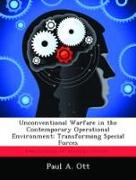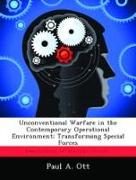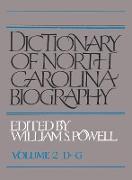Unconventional Warfare in the Contemporary Operational Environment: Transforming Special Forces
BücherAngebote / Angebote:
The emphasis on special operations and specifically unconventional warfare (UW) has grown significantly since the end of the Gulf War. The contemporary operational environment (COE) in which the U.S. military operates today is dictating this emphasis. The COE is the complex global environment that exists today. It encompasses the effects of globalism, changes in the global power structure, the proliferation of technology and weapons of mass destruction, and the entire spectrum of threats that exist-from traditional nation-state actors to emerging non-state actors. The core purpose of Army Special Forces (SF) has been, and will continue to be UW. The ability to operate in this dynamic, ambiguous environment through, with, and by indigenous and surrogate forces often makes SF an ideal economy of force for operations in the COE. This study looks at the SF organization to determine what changes are indicated from the COE for it to continue to provide a viable, effective UW capability. The study first analyzes the historical origins and evolution of the SF organization from World War II through the Gulf War. The study then defines and analyzes the COE and recent SF operations since the end of the Gulf War. From this analysis, the study identifies areas in which the SF organization needs to change in response to the COE. The study identified the direct and indirect impacts on the SF organizational structure. Direct effects of the COE include personnel and training changes resulting from the increased emphasis on human intelligence (HUMINT) and information technologies for SF to operate effectively in the joint, multinational, and interagency environment. Indirect effects of the COE include increases in command and control, combat support, and combat service support assets required to conduct multiple, sustained special operations globally.
Folgt in ca. 15 Arbeitstagen


